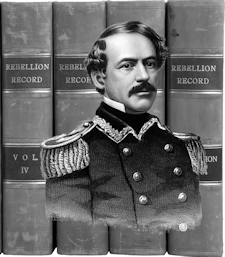February 1.—At Leavenworth, Kansas, an interview was held between Mr. Dole, the Commissioner of Indian Affairs, and the chiefs of several of the loyal tribes of Indians. The chiefs were Opothleyoholo, of the Creeks, Alektustenuk, of the Seminoles, and several representatives of the Iowa tribes. The interview was of an impressive character, and the conference covered the entire range of topics relative to the status of the Indian tribes, their relations to the Government, and their position as regards the rebellion. Commissioner Dole informed the chiefs that the Federal Government had no intention of ever calling upon its red children to take a share in the contest, but a portion of the Indians having proved false to their allegiance, and, under the instigation of designing men, having driven the loyal Indians from their homes, the Government would march its troops down into the Indian country and compel submission.—(Doc. 24.)
—By order of the Provisional Government of Kentucky, the name of Wolfe County was changed to Zollicoffer County. The county of Zollicoffer will perpetuate on the records of Kentucky the name of one whose fame belongs to struggling freemen every where.—Louisville-Nashville Courier, February 3.
—A skirmish took place to-day near Bowling Green, Ky., on the Green River, between a party of rebels and a company of the Second Cavalry, Forty-first regiment Indiana Volunteers, commanded by Captain J. B. Presdee. The rebels lost three killed and two wounded; none of the National soldiers were injured.—(Doc. 25.)
—The Spanish steamer Duero arrived at Liverpool, Eng., from Cadiz, bringing as passengers the captains of three American ships, captured and burned by the privateer Sumter.—(Doc. 26.)



